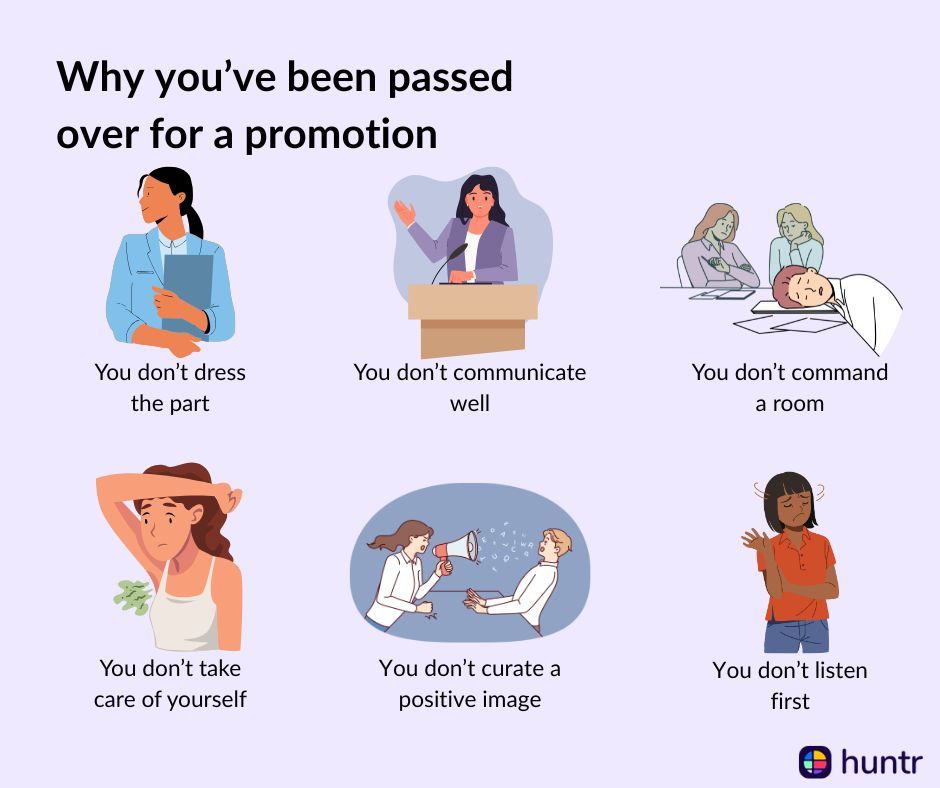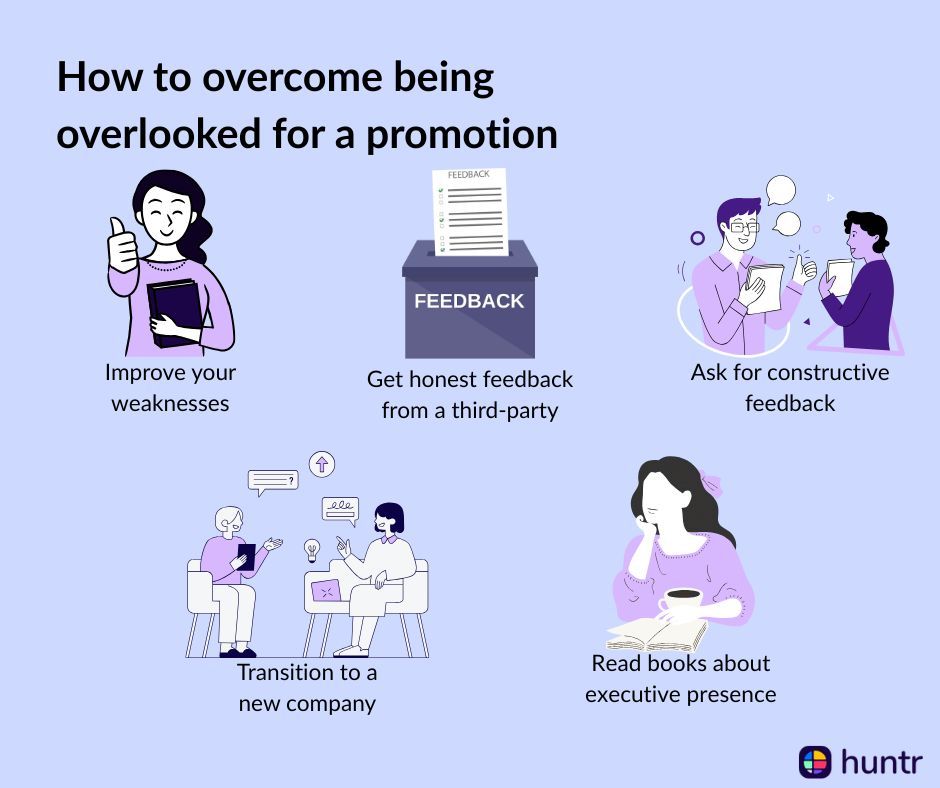Huntr Blog
I’ve Been Passed Over For A Promotion. Now What?
February 22, 2024
You’ve spent years mastering your craft to prove yourself as an industry expert. Gaining knowledge, skills, and boosting your network have helped you grow yourself into a notable thought leader. But when it came time for a promotion, your boss passed you over. Now, feeling crushed, you’re wondering what went wrong, what to do next, and how to dust yourself off so you can better position yourself for the next one that comes around. In this article, we’ll explore why you might have been passed over for a promotion, and what to do after being overlooked for a promotion at work.
Overlooked for a big promotion? You deserve better.
Sign up for Huntr to build your resume and cover letter and find a new boss who appreciates you.
Why You’ve Been Passed Over For a Promotion
Most promotions are about a person’s executive presence. If they act like a leader, get along with those in senior roles above them, and look like a leader they’ll be more likely to get promoted. Whether we like it or not, there may be biases that prevent us from getting promoted and that if we worked on, we’d be able to rise above them. But some of those conversations are inappropriate to have with colleagues, so when we directly ask for feedback, we might get an altered truth rather than the real thing. Here are a few reasons why you might’ve been passed over for a promotion. (And we apologize in case some of these are hard to hear).
1. You don’t dress the part
How you dress plays a role in the impression others have of you. If you have ketchup stains on your clothing after lunch, others may perceive you as a sloppy person. If you go to work with messy hair, it may signal to others that you’re unorganized. Part of how people perceive you is in the way you dress and groom yourself. You not only want to dress like your colleagues but you also want to dress like the people above you. If everyone is wearing t-shirts at work, then they should dress in a similar style. However, if most of the leaders at your company are dressed in suits, then you’ll want to have a more formal attire.
2. You don’t communicate well
Communication skills are necessary for advancements in your career. If you communicate poorly, such as a blunt communication style, you might not get along with others which could negatively affect how people perceive you. But communication can also be something as simple as your accent. Notably, Margaret Thatcher had been told she had a shrill voice. With a little bit of help from a vocal coach, she worked on the tone of her voice. As a result, she became a world leader by serving as Prime Minister of the United Kingdom. If people don’t like your voice or struggle to understand your accent, these are things you can modify and improve to help you elevate in your career. However, due to the sensitive nature of the topic, it’s possible that people aren’t willing to share this kind of feedback with people.
3. You don’t command a room
Commanding a room isn’t always about saying the right thing. Your silence can be hard to hear when you have a powerful presence. If you’ve been overlooked for a promotion because you don’t command a room, take a look at your body language when collaborating with others. Make more eye contact with others. Avoid speaking too much or too fast. Keep your words concise. Connect with others too. You don’t want to be too agreeable but you don’t want to be too disagreeable either. You want to strike a balance between saying what needs to be said and still being sensitive to those around you. Commanding a room might also be about bringing people closer together to create a more unified feeling amongst everyone.
4. You don’t treat people with respect
You might’ve been overlooked for a promotion because you don’t treat the people around you with respect. If you tend to think your ideas are the best and there’s only one way of doing things (your way) you probably won’t get very far in your career. You have to be open and receptive to the fact that there are other people around you. Your team can have great ideas, deserve to be heard, and should have their ideas implemented as well. You don’t want to talk over people, interrupt them, or tell them to stop talking either. Give people space to speak.

5. You lack gravitas
If you’ve been passed over for a promotion, you may lack gravitas. Gravitas is all about your presence in the room. You’ll want to get feedback from others about your gravitas at work and in your personal life to help you develop it. You might work with an executive coach to help you further improve your gravitas. You’ll want to be poised, have good judgment, avoid filler words, present yourself confidently (not arrogantly), and communicate less. You want everything you do to showcase your power.
6. You can’t read the room
Some people get passed over for a promotion because they can’t read the room. They might live in their own world or bubble and not notice how the people around them feel around them. When communicating with others, you’ll want to observe people’s body language and communication to guide you in how to behave. When presenting, if people look bored, you need to stop talking or start presenting in a different manner. You’ll also want to notice the context of a situation. By assessing the context, you’ll be better able to connect with people you speak with.
7. You don’t take care of yourself
This one is a sensitive matter, which makes it hard for people to share this feedback with others. However, one of the reasons why some people may be passed over for a promotion involves their fitness. If you look like you don’t care for yourself, others may think you’re not fit to take care of a company. Overall, you want to look like the type of person who exercises, eats well, invests in their mental health, and takes care of themselves. This kind of feedback is rare to get as it’s sensitive in nature and is packed with bias. But it is a common factor people consider for senior leaders and executives. People do wonder if someone is healthy enough to manage a highly stressful job. For example, you might’ve noticed how people will talk about the health of a President if he’s older or doesn’t communicate something well. How healthy a person is does contribute to whether or not people perceive them as fit for a role. Since it can be viewed as discrimination, it’s rarely communicated to people who get overlooked for promotions.
8. You don’t curate a positive online image
You might get overlooked for a promotion if your online image isn’t well curated or positive. If you post a ton of hateful content, you could miss out on opportunities. In general, you’ll want to steer clear of controversial topics, such as bioethics, politics, wars, religion, conspiracy theories, and so on. Employers do see your comments on social media. If you spread negativity online or post unprofessional content, you might get pulled out of the running for a promotion. Curating a collection of content that positions you as a thought leader, expert, or shares a positive tone online can help you amass more opportunities.
9. You aren’t decisive
Risk takers and decision makers often rise up the ranks fast. You have to be willing to take a bet on something. That sometimes means making unpopular decisions. Other times, you’ll need to disagree with people with more seniority than you. You need to be able to take a hard stance on something and commit to it. If you’re wrong, you might be out. But if you’re right, then you build and gain more trust and credibility from those around you, elevating you up even higher in your career. Trust your decision making. You’ve spent years building your expertise up. You do know what the right decisions you need to make are. So, take the leap, make the case, and take the stand. It could be just what you needed to grow in your career.
10. You don’t listen first
The most powerful people in the room always speak last. Let everyone else share their thoughts and opinions first. By giving people a chance to speak, you can hear all the ideas to help guide you on what the best path to take is. By being the last person to speak, your words will have the most weight. This often works best in discussions about how to solve problems or improve things. If it’s a team meeting, typically the leader speaks first. If you’re doing a brainstorm session, avoid being the person who speaks the most as your words won’t have enough weight. Speak only when you have something original to say or something that ties everything that’s being said together succinctly.
How to Overcome Being Overlooked for a Promotion
1. Improve your weaknesses
If you have an inkling at what your weaknesses may be, you could take some time to work on them. For example, if people say you dress unprofessionally, you might work with a stylist to help you shop for some new clothes. Some clothing stores at malls have stylists who help you shop so it doesn’t need to be an add-on cost. If your weakness is a communication issue, you might work with a coach to help you communicate better. There’s even executive presence coaches that you can hire to help you become a more well-rounded leader. The list above may help you understand where you could improve. After all, you might have experience being told where you could improve or maybe what you need to change to improve your chances of moving up. Avoid resisting the feedback. Have a growth mindset approach to it instead. By focusing on your self-improvement, you can rise as a leader. Everyone can improve in one way or another. So don’t take it personally that you have weaknesses you can improve upon. These changes are about helping you achieve what you want in life. Improving your weaknesses to become an even better leader is a good thing.
2. Hire a third-party to give honest feedback
A third-party will be more likely to give you honest feedback than a colleague. Giving negative feedback can be hard for some people to do. And because some of the feedback can be seen as harassment or bias, sometimes colleagues won’t be able to tell you what’s actually holding you back. For example, a woman who shows cleavage might get passed over for a promotion for dressing inappropriately. However, if a male colleague gives feedback on how she dresses, she might accuse him of sexual harassment. So, there are topics that are more sensitive in nature, that your colleagues might not address with you. However, if you hire a coach to give you feedback on all areas on how you present yourself, they might be willing to dish out the truth to you without fear of repercussions.
3. Ask your colleagues for constructive criticism
While some topics might not be brought up by colleagues, if you ask enough of your colleagues for feedback, you might find some directions to focus your efforts on. If it’s directly related to the work you do, soft skills like communication, or your ability to command a room, your colleagues might find it easier to share constructive criticism. Take the time to ask as many people as you can for feedback. The more stuff you have to work on, the easier it’ll be to implement the changes people around you would like. Plus, you’ll start to see patterns in how people think of you, which will allow you to know where to double down on. And once people start seeing positive changes in you, you’ll be able to move up a bit easier.
4. Transition into another company
If you’ve been passed over for a promotion, you might decide it’s time to transition into another company. Maybe you’ve meticulously made so many improvements to yourself but you’re just working at the wrong place. Maybe the people around you aren’t actually seeing how you’ve improved because they have a fixed mindset. If one door closes, other doors will be open to you. There’s no rule saying that you have to stay loyal to a company if you can’t grow there. Moving on to another company might be just what you need to help you grow in your career. You can use a resume builder to craft a new resume and a cover letter generator to create a custom cover letter for your next role.

5. Read books about personal branding and presence
There are countless books online and in stores about personal branding and building an executive presence. If you’ve been overlooked for a promotion, you can read books to find ways to boost your gravitas, how you present yourself, and mold yourself into the type of leader people look towards. Learning how to lead is a skill that can be improved upon. If you don’t fit the mold of what a leader looks like today, it doesn’t mean the road is closed off to you. You can develop new skills, improve your weaknesses, and learn how to better present yourself to others. So that one day, someone looks at you and thinks, “Now that’s a leader.” If you can’t afford a coach, reading books written by coaches in these fields can help you learn what they would’ve taught you so you can improve your ability to lead and look like a leader to those around you.
You’ve Been Passed Over For a Promotion. Now what?
At this point, you might have some clues as to why you’ve been looked over for a promotion and what you’ll need to do next. The key to remember is that you are changeable and you can get better with time. Be open to improving yourself, so that the next time an opportunity rolls around, you’re the first person people consider for the role. Hearing how you need to improve can be difficult. But know that life is a journey of self-improvement. You’re supposed to get better with time. Have fun molding yourself in new ways to level up the kind of leader you hope to become one day. And if staying put in the same place doesn’t feel right for you anymore, sign up for Huntr to build your resume and cover letter, track your interviews, and apply to jobs faster with application autofill.
Get More Interviews, Faster
Huntr streamlines your job search. Instantly craft tailored resumes and cover letters, fill out application forms with a single click, effortlessly keep your job hunt organized, and much more...
AI Resume Builder
Beautiful, perfectly job-tailored resumes designed to make you stand out, built 10x faster with the power of AI.
Next-Generation Job Tailored Resumes
Huntr provides the most advanced job <> resume matching system in the world. Helping you match not only keywords, but responsibilities and qualifications from a job, into your resume.
Job Keyword Extractor + Resume AI Integration
Huntr extracts keywords from job descriptions and helps you integrate them into your resume using the power of AI.
Application Autofill
Save hours of mindless form filling. Use our chrome extension to fill application forms with a single click.
Job Tracker
Move beyond basic, bare-bones job trackers. Elevate your search with Huntr's all-in-one, feature-rich management platform.
AI Cover Letters
Perfectly tailored cover letters, in seconds! Our cover letter generator blends your unique background with the job's specific requirements, resulting in unique, standout cover letters.
Resume Checker
Huntr checks your resume for spelling, length, impactful use of metrics, repetition and more, ensuring your resume gets noticed by employers.
Gorgeous Resume Templates
Stand out with one of 7 designer-grade templates. Whether you're a creative spirit or a corporate professional, our range of templates caters to every career aspiration.
Personal Job Search CRM
The ultimate companion for managing your professional job-search contacts and organizing your job search outreach.

